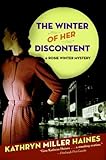 I recently read Kathryn Miller Haines' first novel in the Rosie Winter Series and enjoyed it. A touch of film noir spiced up with theatre and cozy-mysteryness all added up to a fun light diversion. I picked up The Winter of Her Discontent after putting down Inkheart and found that the second novel in the series is even better.
I recently read Kathryn Miller Haines' first novel in the Rosie Winter Series and enjoyed it. A touch of film noir spiced up with theatre and cozy-mysteryness all added up to a fun light diversion. I picked up The Winter of Her Discontent after putting down Inkheart and found that the second novel in the series is even better. As a hopeful aspiring writer, I enjoy reading the first book in a series. I am curious how authors set up their characters and their worlds. The descriptions that they employ and the worlds that they create capture my imagination. In many cases I think the first book in the series is the best. Authors work so hard to set up a world that they too often rest on their laurels and the books quickly go downhill and become derivative. However, in the gap between first and worst, there are great mysteries and Haines' second Rosie Winter story is one of those.
One of the best changes in the two books is Haines' willingness to drop the excessive use of film noir slang. While I liked her accurate terminology in War Against Miss Winter I did want her to stop using "jawing" and occasionally write, "she said." In this novel she does just that. Haines incorporates the occasional slang to liven up the story and remind the reader that it is 1943 New York City. But the occasional dab is significantly more effective than the excessive glop from the first novel.
In addition, I read until page 380 before I knew the whole plot. It is rare for a regular mystery reader to not have a decent clue whodunit and why within the first half of the novel. I admit, I had a good sense of who was overly suspicious, but I didn't find out until Rosie did exactly what the mystery entailed. I liked having the gasp of understanding that a good mystery creates.
Last, but most assuredly not least, I respect Haines for putting out there the negative aspects of World War II on the homefront. So many movies and stories have appeared in the past ten years which show the horrors of the war and the optimism of the homefront that I can't keep track of them. Haines shows the horrors of the homefront. Life was not pleasant. Everyone was not perfect. People took advantage of their fellow man and their government. And Haines does a good job showing the complicated world of navigating patriotism, greed, and practicality.
All in all, if you like historical mysteries, a good read and a good addition to the mystery genre. Now I'm going to have to add the third book to my to-read list.
* * * * *
If you would like more Historical Mysteries try:
- Jacqueline Winspear's Maisie Dobbs series
- Rhys Bowen's Her Royal Spyness series
- Anything by Anne Perry (she has multiple GREAT series)
No comments:
Post a Comment